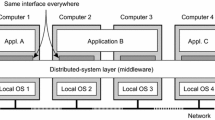Abstract
We study the relationships between a number of behavioural notions that have arisen in the theory of distributed computing. In order to sharpen the under-standing of these relationships we apply the chosen behavioural notions to a basic net-theoretic model of distributed systems called elementary net systems. The behavioural notions that are considered here are trace languages, non-sequential processes, unfoldings and event structures. The relationships between these notions are brought out in the process of establishing that for each elementary net system, the trace language representation of its behaviour agrees in a strong way with the event structure representation of its behaviour.
Similar content being viewed by others
References
Aalbersberg IJ Rozenberg G (1986) Theory of traces. Technical report no. 86-16, Institute of Applied Mathematics and Computer Science, University of Leiden, Leiden, The Netherlands
Bednarczyk M (1988) Categories of asynchronous systems. Ph.D. thesis, Computer Science Department, University of Susex. Brighton, G.B.
Best E, Devillers R (1987) Sequential and concurrent behaviour in Petri net theory. TCS 55:87–136
best E, Fernandez C (1988) Non-sequential processes: a Petri net view. EATCS Monographs on Theoretical Computer Science 13. Springer, Berlin Heidelberg New York
Brauer W, Reisig W, Rozenberg G (1987) Advances in Petri nets 1986 part I. Lect Notes Comput Sci 254
Brauer W, Reisig W, Rozenberg G (1987) Advances in Petri nets 1986 part II, Lect Notes Comput Sci 255
Kiehn A (1988) On the interrelation between synchronized and non-synchronized behaviour of Petri nets. J Inf Process Cybern 2:3–18
Mac Lane S (1971) Categories for the working mathematician. Springer, Berlin Heidelberg New York
Mazurkiewicz A (1978) Concurrent program schemes and their interpretation. DAIMI report PB-78. Computer Science Department, Aarhus University, Aarhus, Denmark
Mazurkiewicz A (1989) Basic notions of trace theory. Lect Notes Comput Sci 354:285–363
Nielsen M, Plotkin G, Winskel G (1981) Petri nets, event structures and domains, Part I. TCS 13:85–108
Petri CA (1962) Kommunikation mit Automaten. Institut für Instrumentelle Mathematik, Schriften des IIM Nr 2
Reisig W (1984) Partial order semantics versus interleaving semantics for CSP-like languages and its impact of fainrness. Lect Notes Comput Sci 172:403–413
Rozenberg G (1987) Behaviour of elementary net systems. Lect Notes Comput Sci 254:60–94
Rozoy B, Thiagarajan PS (1987) Event structures and trace monoids. Technical report 87-47. Laboratoire d'Informatique Théorique et Programmation University of Paris VII Paris, France
Shields MN (1989) Behavioural presentations. Lect Notes Comput Sci 354:673–689
Stark EW (1987) Concurrent transition systems and semantics of process networks. 14th ACM Conference on Principles of Programming Languages 199–210
Thiagarajan PS (1987) Elementary net systems. Lect Notes Comput Sci 254:26–59
Thiagarajan PS (1988) Some behavioural aspects of net theory. Lect Notes Comput Sci 317:630–653
Winskel G (1987) Event structures. Lect Notes Comput Sci 255:325–392
Author information
Authors and Affiliations
Additional information
M. Nielsen received a Master of Science degree in mathematics and computer science in 1973, and a Ph.D. degree in computer science in 1976 both from Aarhus University, Denmark. He has held academic positions at Department of Computer Science, Aarhus University, Denmark since 1976, and was visiting researcher at Computer Science Department, University of Edinburgh, U.K., 1977–79, and Computer Laboratory, Cambridge University, U.K., 1986. His research interest is in the theory of distributed computing.
Grzegorz Rozenberg received a master of engineering degree from the Department of Electronics (section computers) of the Technical University of Warsaw in 1964 and a Ph.D. in mathematics from the Institute of Mathematics of the Polish Academy of Science in 1968. He has held acdeemic positions at the Institute of Mathematics of the Polish Academy of Science, the Department of Mathematics of Utrecht University, the Department of Computer Science at SUNY at Buffalo, and the Department of Mathematics of the University of Antwerp. He is currently Professor at the Department of Computer Science of Leiden University and Adjoint Professor at the Department of Computer Science of the University of Colorado at Boulder. His research interests include formal languages and automata theory, theory of graph transformations, and theory of concurrent systems. He is currently President of the European Association for Theoretical Computer Science (EATCS).
P.S. Thiagarajan received the Bachelor of Technology degree from the Indian Institute of Technology, Madras, India in 1970. He was awarded the Ph.D. degree by Rice University, Houston Texas, U.S.A, in 1973. He has been a Research Associate at the Massachusetts Institute of Technology, Cambridge a Staff Scientist at the Geosellschaft für Mathematik und Datenverarbeitung, St. Augustin, a Lektor at Århus University, Århus and an Associate Professor at the Institute of Mathematical Sciences, Madras. He is currently a Professor at the School of Mathematics, SPIC Science Foundation, Madras. He research intest is in the theory of distributed computing.
Rights and permissions
About this article
Cite this article
Nielsen, M., Rozenberg, G. & Thiagarajan, P.S. Behavioural notions for elementary net systems. Distrib Comput 4, 45–57 (1990). https://doi.org/10.1007/BF01783665
Received:
Revised:
Issue Date:
DOI: https://doi.org/10.1007/BF01783665




